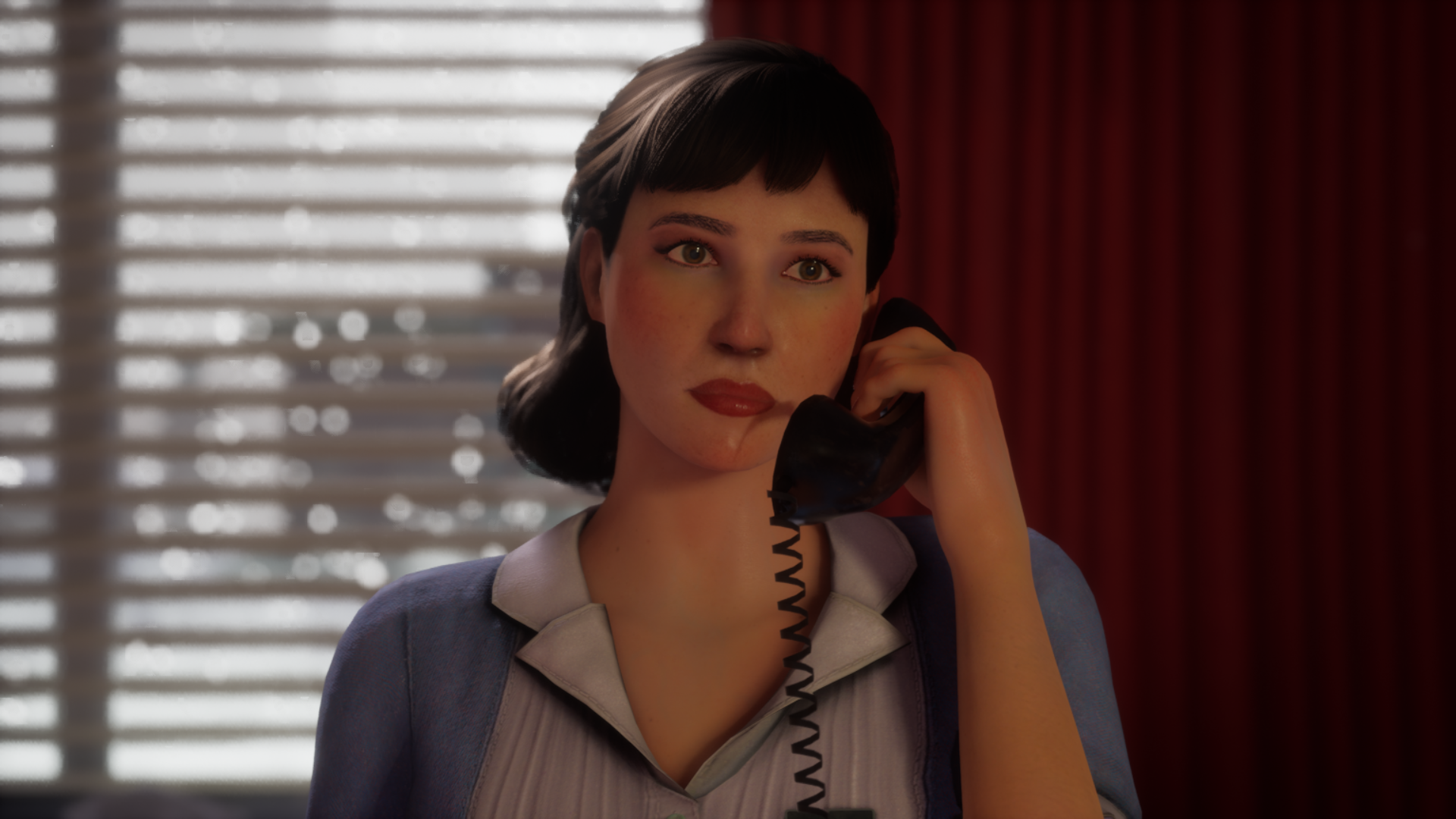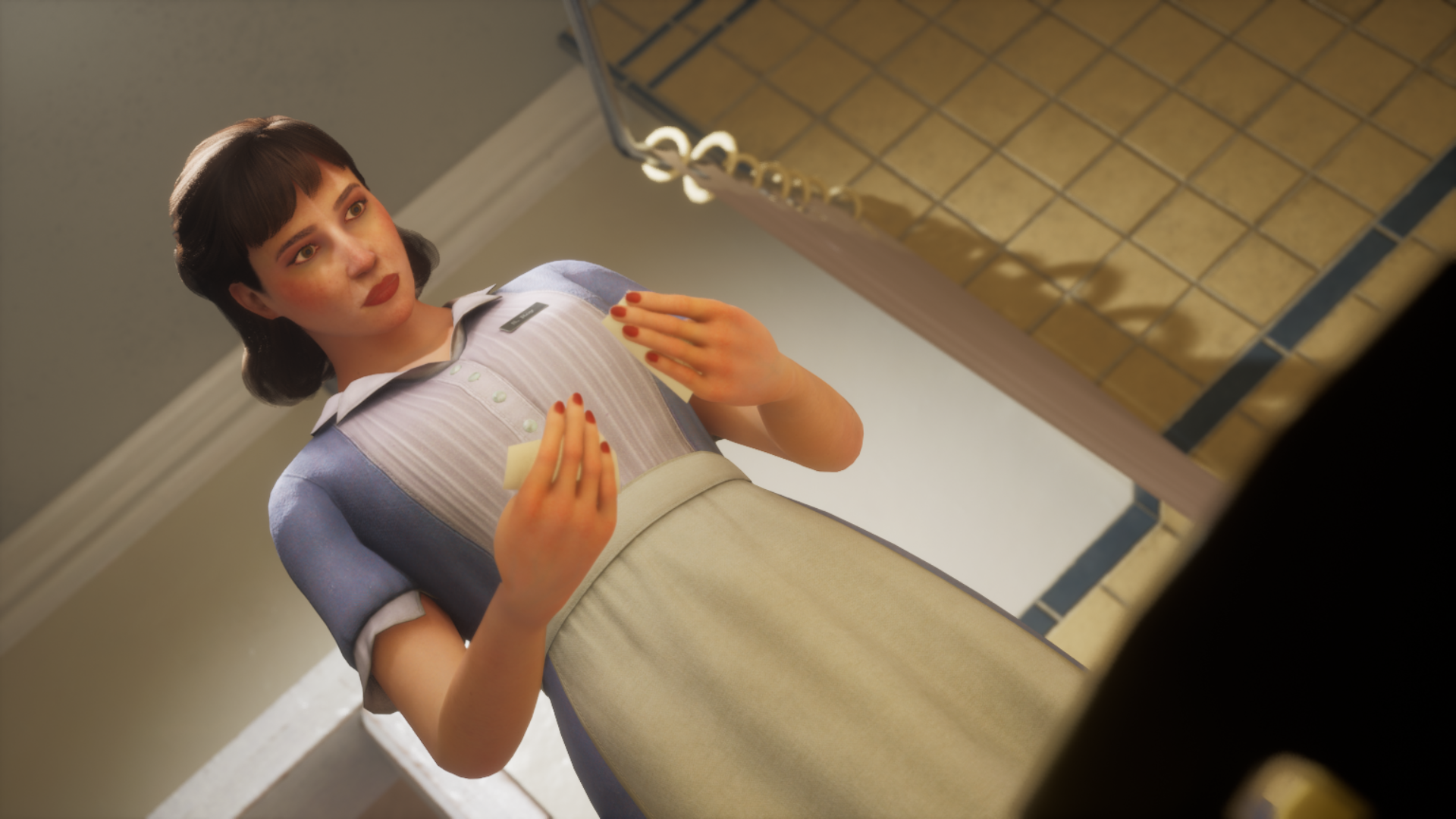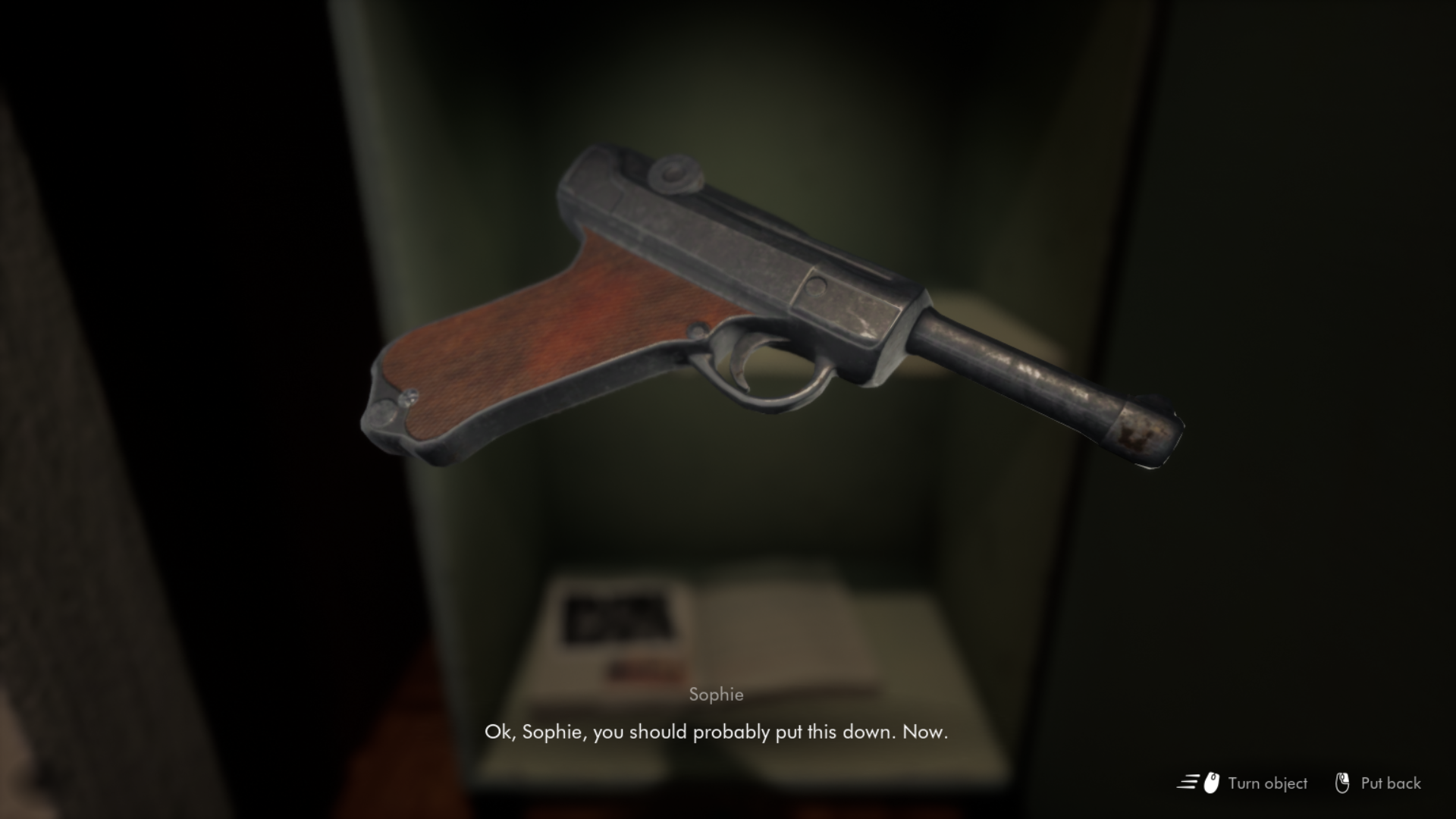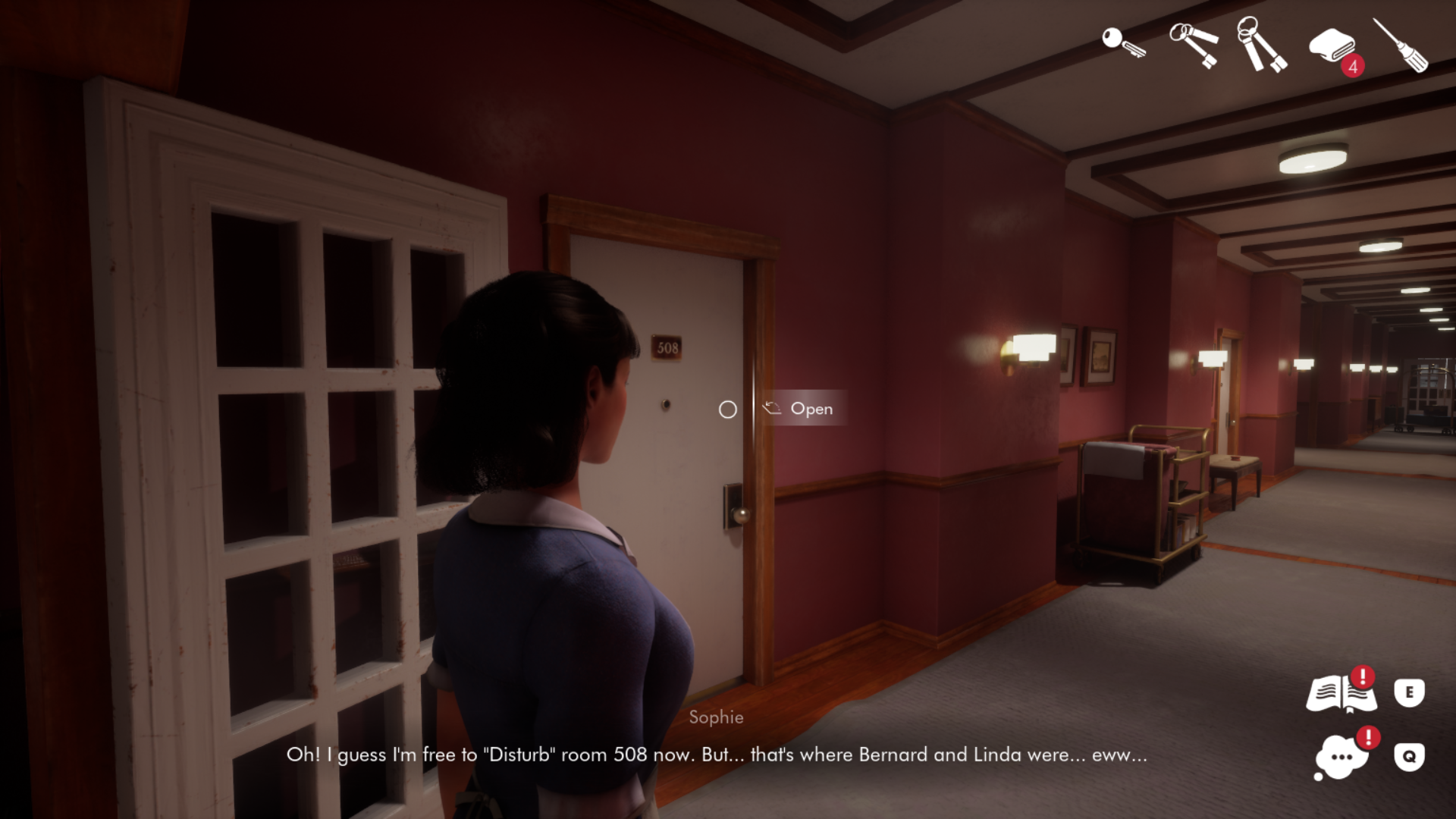
What is it? An amateur detective game where your snooping can get you into trouble.
Release date November 1, 2023
Expect to pay $25/£21
Developer Lowbirth Games
Publisher Lowbirth Games
Reviewed on ASUS ROG Zephyrus G gaming laptop
Steam Deck Playable
Link Official site
At time of writing, I’ve never been employed as a space marine, supersoldier, bard, Spider-Man, or most of the jobs that character’s in video games tend to have. But in This Bed We Made you play as Sophie, a maid in a 1950’s hotel. I have worked as a cleaner in a hotel, so I speak with some authority when I say that Sophie should be fired immediately.
You ‘clean’ each room by emptying the bins (good), scrubbing the bathtubs (great), placing fresh towels in the bathrooms (lovely), and making the beds by just smoothing out the sheets without even replacing the bedding (prison). “Nothing like a well-made bed,” Sophie even says afterwards. The bloody nerve.
So if you’re looking for an immersive maid sim you’ll be disappointed. But if you’re looking for a nosy amateur detective adventure where you get to indulge your inner snoop—which I’ll begrudgingly concede is a lot more fun than making a bed properly—you’ll find a great little game here. It’s a nice example of how a new perspective can freshen up a genre, if not the bedsheets.
Considering how much shady activity they’re involved in, the guests of the Clarington hotel are incredibly careless about leaving out incriminating correspondence, detailed records of debts unpaid, and all sorts of juicy puzzle pieces that you slowly slot together to create a picture of the room’s occupant. One guest has converted his bathroom into a photography blackroom, and it’s hard to focus on giving the tub a good scrub when you notice that several of the photos hanging up are of Sophie. Yikes. Thus begins an investigation into why exactly a guest has taken an interest in you.
The game is told in flashback, framed by Sophie's interrogation by a police detective. A familiar trope, as fans of Persona 5 and, er, Quantum Break will tell you. But it’s an effective one here, as you’re constantly faced with choices that could potentially make that inevitable showdown in the interrogation room very unpleasant indeed. You can choose to throw away certain objects and notes you find, which some squares might call "evidence tampering".

There's a persistent feeling that you could get yourself into real trouble here.
It’s not just the beds you can leave in a bad state either, as it’s easy to be careless about covering your tracks when snooping. After so many detective games have let me trample all over crime scenes consequence-free, it’s refreshing to play something that rewards a more considerate approach.
It’s not always as simple as remembering to clean up after yourself, either. Those creepy photos you found of yourself? They’re of you snooping through a guest’s belongings. It’s left up to you whether you destroy these incriminating snaps. Agonising decisions like this keep catching you off your guard in a game that’s really adept at juggling tones. One minute the mystery is pushed into the background so you can have a gossip with a coworker, picking romantic dialogue options or deliberately silly ones. Later this could pass for a straight-up horror game, especially when the sound effects start messing with you. Rarely has the creak of footsteps instilled this much fear in me as I rifle through someone’s suitcase.
Disco Elysium liked to remind you that because you were a cop, you could get away with a lot of strange behaviour thanks to the power and authority your job gave you. Sophie is a woman working as a maid in the 1950’s, so naturally has almost no power at all. The grim imbalance between the sexes and the abuse of authority are constant themes and threats. There’s a persistent feeling that you could get yourself into real trouble here, an excellent tension that runs throughout your unauthorised investigation.
Maid up

A few puzzles are introduced, such as a cipher that needs to be cracked, riddles that need to be solved for a locker combination, etc. Fun enough, but the real puzzle is how all the evidence you’re gathering fits together. As you discover relationships between the different guests, the initial mystery of why someone was taking photos of you deepens and darkens. I had a blast trying to untangle it.
The letters you’re peeking at, incidentally, are so beautifully written that even the unseen characters leap off the page. Most are funny, some are sinister, and many are heartbreaking. They’re full of messy dramas and roads tragically not taken. Honestly, the real mystery here is how a game this well-written ended up with a title as bad as This Bed We Made.
Its on-screen characters are great too. Beth on the reception desk is the sharp-tongued best friend you always wish you’d had, even if that’s just because the idea of having her as your enemy is too terrifying. Fellow colleague Andrew is more of a pushover and a joy to tease (try telling him you found a love letter for him in one of the rooms) and you can choose between him or Beth as your partner in solving the mystery, helping justify a replay. The game captures the tedium and tiny joys of the workplace really well, crucially without ever slipping into being tedious itself. The terrific dialogue helps, delivered by a fantastic voice cast. Make sure you take the time to eavesdrop on conversations behind locked doors.

You actually have to engage with the material and think through your choices, or the game will happily roll credits without resolving everything.
Sophie herself is mostly terrific company. Easy to like with her compassion for her suffering colleagues and her infectious enthusiasm for a good mystery. I particularly enjoyed how rubbish she is at lying (until this got me in trouble, naturally). But she does have an annoying habit of jumping ahead of you. Examine a letter containing a revelation and Sophie reacts with some commentary the very second you inspect it—as in, before you’ve had a chance to read it yourself. Imagine trying to read a mystery novel with someone reading ahead over your shoulder. It’s a minor issue, but a persistent one.
I finished my first playthrough with satisfying answers to a lot of the game’s mysteries, but not all, and certainly didn’t feel as if justice had been served. You actually have to engage with the material and think through your choices, or the game will happily roll credits without resolving everything, which is exactly what I want from a detective game. That short 3-4 hour runtime turns out to be a point in its favour. Imagine having to replay all of L.A. Noire to get closure on its mysteries. When you’ve finished weeping, remember that a replay of a short experience to see if you can course correct is a far more tantalising prospect. Especially when it's a detective game debut as accomplished as this one.







